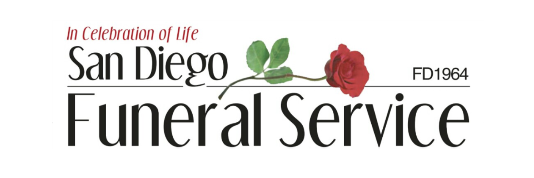
Toll free -
Copyright 2013 © San Diego Funeral Service FDR 2911 FD 964 -

What is the purpose of a funeral? [Pre-
Funerals provide surviving family members and friends a caring, supportive environment in which to recognize the death of a loved one and to share thoughts and feelings about that person. Funerals are the first step in the healing process. The ritual of attending a funeral service provides many benefits including:
Providing a social support system for the bereaved
Helping the bereaved understand death is final and part of life
Integrating the bereaved back into the community
Easing the transition to a new life after the death of a loved one
Providing a safe haven for embracing and expressing pain
Reaffirming one's relationship with the person who died
Providing a time to say good-
It is possible to have a full funeral service even for those choosing cremation. The importance of the ritual is in providing a social gathering to help the bereaved begin the healing process.
I've never arranged a funeral before. What do I need to know?
At some time in our lives, most of us will make or assist in making funeral arrangements. This will not be an easy time, but we offer these tips for smart planning:
Be an informed consumer and ask questions
Choose an independent funeral home and a licensed funeral director
Discuss all service and payment options during the funeral arrangements
Make sure you receive a copy of the funeral home's General Price List
Be prepared to make decisions and organize details in advance of need
Plan a personalized and meaningful ceremony to help you begin healing
What do funeral directors do?
Funeral directors are caregivers and administrators. They make the arrangements for the transportation of the deceased, complete all necessary paperwork, and implement the choices made by the family regarding the funeral and final disposition of the deceased.
Funeral directors are listeners, advisors, and supporters. They have experience assisting the bereaved in coping with death. Funeral directors are trained to answer questions about grief, recognize when a person is having difficulty coping, and recommend sources of professional help. Funeral directors also link survivors with support groups at the funeral home or in the community.
What types of funeral services exist?
Every family is different, and not everyone wants the same type of funeral. Funeral practices are influenced by religious and cultural traditions, costs, and personal preferences. These factors help determine whether the funeral will be elaborate or simple, public or private, religious or secular, and where it will be held. They also influence whether the body will be present at the funeral, if there will be a viewing or visitation, and, if so, whether the casket will be open or closed and whether the remains will be buried or cremated.
Why have a public viewing?
Viewing is part of many cultural and ethnic traditions. Many grief specialists believe that viewing aids the grief process by helping the bereaved recognize the reality of death. Viewing is encouraged for children as long as the process is explained and the activity voluntary.
Embalming Questions
What is the purpose of embalming?
Embalming sanitizes and preserves the deceased, retards the decomposition process, and enhances the appearance of someone disfigured by traumatic death or illness. Embalming makes it possible to lengthen the time between death and the final disposition, thus allowing family members time to arrange and participate in the type of service most comforting to them.
Is embalming required by law?
No. Most states, however, require embalming when death is caused by a reportable contagious disease or when a deceased is to be transported from one state to another by a common carrier, or if final disposition is not to be made within a prescribed number of hours.
Cremation Questions
Is cremation a substitute for a funeral?
As more people are choosing cremation, funeral service professionals are striving to give consumers a true sense of what their many options are for a funeral service. Often funeral directors find that people have a preconception that they have fewer choices for a ceremony when selecting cremation for themselves or a loved one. Therefore, they request direct cremation and deny the surviving friends and family the opportunity to honor them with a memorial service. In actuality, cremation is only part of the commemorative experience. In fact, cremation can actually increase your options when planning a funeral. Cremation gives people the flexibility to search for types of tributes that reflect the life being honored. But, this doesn't mean that aspects of traditional funeral services have to be discarded. Even with cremation, a meaningful memorial that is personalized to reflect the life of the deceased could include:
A visitation prior to the service
An open or closed casket
Special music
A ceremony at the funeral chapel, your place of worship, or other special location
Participation by friends and family
Commonly, cremated remains are placed in an urn and committed to an indoor or outdoor mausoleum or columbarium, interred in a family burial plot, or included in a special urn garden.
Cremation also gives families the option to scatter the remains. This can be done in a designated cemetery garden or at a place that was special to the person. Today, cremated remains can even become part of an ocean reef or made
Into diamonds.
Where can I get more information on cremation?
We can assist you with the necessary information for a funeral or memorial service with a cremation. For more technical information about the cremation process, we encourage you to view information online at the National Funeral Directors Association.
Funeral Cost Questions
What does the average funeral cost?
“The national median cost for a funeral with viewing and burial for calendar year 2016 was $7,360. If a vault is included, something that is typically required by a cemetery, the median cost $8,508. The cost does not take into account cemetery. Monument or marker costs or miscellaneous cash advance charges, such as flowers or an obituary. Many factors contribute to the final determination of how an individual firm prices its goods and services, including the firm’s business philosophy and the market in which it operates.”( Different year 2018, same source, http://www.nfda.org/news/statistics ).
What recourse does a consumer have for poor service or overcharging?
Funeral service is regulated by the Federal Trade Commission and state licensing boards. In most cases, the consumer should discuss problems with the funeral director first. If the dispute cannot be solved by talking with the funeral director, the consumer may wish to contact the Funeral Service Consumer Assistance Program. FSCAP provides information, mediates disputes, provides arbitration, and maintains a consumer-
What to Do If Death Occurs
What should I do if a death occurs at home?
When death occurs, San Diego Funeral Service personnel are available to assist you at any hour, seven days a week. Please call 619-
Will someone come right away?
If you request immediate assistance, yes. If your family wishes to spend a short time with the deceased to say goodbye, this is acceptable. Our staff will come when the time is right for you.
If a loved one dies out of state, can San Diego Funeral Service still help?
When death occurs away from home, San Diego Funeral Service can assist you with out-

Copyright 2019 © San Diego Funeral Service FD 1964
OFFICE 619-